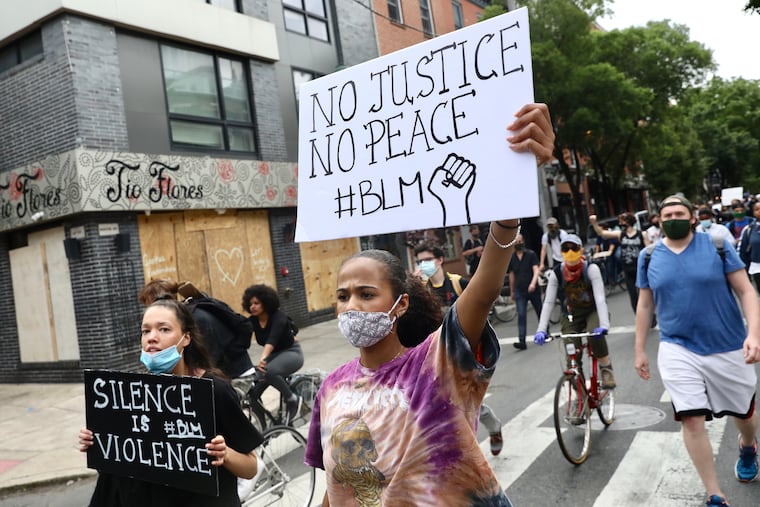Black Lives Matter Movement goes to school to teach students about social justice
"All skin colors are as good as each other. That’s why we should be treated the same," excerpts from a Black Lives Matter song to teach elementary school students about social injustice.

This week, the first graders in Tamar LaSure-Owens’ class have started social studies lessons the same way every day: belting out the lyrics to a Black Lives Matter song that encourages them to speak up about social injustice.
LaSure-Owens used the catchy song to engage students in her virtual class at the Leeds Avenue School in Pleasantville to mark Black Lives Matter at School Week of Action. Teachers across the country are sharing lessons and having frank conversations about the movement with students of all ages.
“All skin colors are as good as each other. That’s why we should be treated the same. But for far too long Black people have suffered, so all around the world we are saying that must change,” the class sang.
In Philadelphia, where more than 50% of students are Black, students began learning about the Black Lives Matter movement in 2017. Other cities, including New York, Chicago, and Los Angeles, are also teaching it. The idea was the brainchild of the Caucus of Working Educators, an activist group within the Philadelphia Federation of Teachers.
City schools are participating for the fifth straight year, said district spokesperson Monica Lewis. Teachers are encouraging students “to see the value of respecting one another and living in a more inclusive society steeped in equity and appreciative of diversity,” she said.
» READ MORE: Black Lives Matter Week of Action, born in Philly, goes national
The Black Lives Matter movement in schools has taken on new meaning ignited after the killing last year of George Floyd by a white police officer in Minnesota. His death after an officer kneeled on his neck for more than eight minutes sparked unrest around the world and protests, some organized by students. A Norwegian lawmaker this week nominated Black Lives Matter for the 2021 Nobel Peace Prize “for their struggle against racism and racially motivated violence.”
“We need to make sure we do not lose that momentum,” said Stephanie James Harris, executive director of the New Jersey Amistad Commission, which helps schools incorporate African American history into their curriculum. “Students need to know how they can galvanize around the idea of how they can be change agents. They are going to be our next generation of leaders.”
The National Education Association, one of the country’s largest teachers’ unions, encouraged its members to participate in activities from Feb. 1 to 5, but not just lesson plans. It called for implementing restorative justice practices, hiring more Black teachers, and mandating Black history and ethnic studies.
“When we come together for education justice, all students win,” wrote Rocio Inclan, senior director of the NEA Center for Social Justice. Locally, the New Jersey Education Association has endorsed the movement and distributed resources to teachers who educate the state’s 1.1 million public school children.
The lessons are not mandatory. It is left to individual teachers whether they participate and how they want to share the curriculum with their students.
New Jersey and Pennsylvania require history to be taught, but districts decide the content of their courses. Students have called for schools to address systemic racism and implicit bias among staff and students.
Harris, who provides professional development to help teachers, said the lessons should be developmentally appropriate and incorporated into the regular curriculum — the same approach she encourages for Black history instruction.
» READ MORE: Haddonfield High School students raise $18K for Black Lives Matter
In Pleasantville, all four of the district’s K-through-fifth-grade schools are participating in the Black Lives Matter lessons, LaSure-Owens said. The district is developing a curriculum for its middle and high school students, she said.
During the hour-long social studies class with first graders, ages 6 and 7, LaSure-Owens showed the class a Sesame Street Black Lives Matter video. In the clip, Elmo questions his father about racism and protests. Students listened intently. Most responded by putting sad emojis on a jamboard.
“That means not right, treating people unfairly,” LaSure-Owens explained.
LaSure-Owens peppered the students with questions. How did it make you feel? How can you stand up to injustice? She asked them to explain being mean and they gave examples such as bullying. They also discussed how to help others and ways to show kindness.
“Everybody should be treated fairly. All Black Lives Matter!” said Anibal Ayala.
“Yes, they do,” responded LaSure-Owens.
The lesson ended with an upbeat “goodbye song” that LaSure-Owens plays at the end of every class. She joined students singing and dancing.
Many districts such as Lower Merion this year said they have not planned a specific curriculum on Black Lives Matter, partly because of remote lessons due to the pandemic. Instead, they plan to use the movement’s principles for ongoing antiracism efforts and cultural lessons. Other schools are focused on Black History Month programs.
Collingswood High School history teacher Eric Fieldman said he supports teaching about the movement but wants it presented throughout the school year. He teaches American history and a civil rights and social justice elective course.
“It can’t just be the one and done,” said Fieldman. “Black history is American history.”